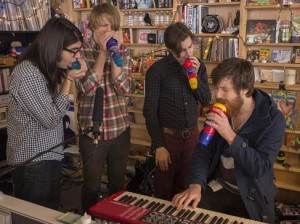Discussions arise in the Popdose back channel. Some of them are the kind of office banter and snark you expect. Others are, as you might surmise from a clutch of music nerds like us, very music nerdy. And occasionally a few cross both territories into a third region. I don’t want to say it is the “we are so old” region because it really isn’t that. Yes, we have had conversations like that as well but I think we are as adjusted to the present as any (and I’m probably the most guilty of backwards glancing).
 It started when a press release with a photo was posted of a new band. I don’t want to say the name of the band, as that might be unfair. I could exert some sort of pressure in dragging them into the light to stone them to death for their cultural sins, but part of me believes they aren’t cognizant enough of their representation to know right from wrong in this case. This would be that their picture had them posing like the most stereotypical, hatted, bearded, corduroy-and-fuzzy-shirt wearing collective this side of Brooklyn. One or two of them might have been wearing the horn-rimmed glasses, although I don’t precisely recollect now. I was too riled up by the toy kazoo-microphones they were all holding.
It started when a press release with a photo was posted of a new band. I don’t want to say the name of the band, as that might be unfair. I could exert some sort of pressure in dragging them into the light to stone them to death for their cultural sins, but part of me believes they aren’t cognizant enough of their representation to know right from wrong in this case. This would be that their picture had them posing like the most stereotypical, hatted, bearded, corduroy-and-fuzzy-shirt wearing collective this side of Brooklyn. One or two of them might have been wearing the horn-rimmed glasses, although I don’t precisely recollect now. I was too riled up by the toy kazoo-microphones they were all holding.
Another staffer pointed out how the current generation of rock-pop aspirants are permanently affixed in the Twee Friend Zone, that there’s little masculinity to be found anymore in the rock idiom. Everyone is content to be fuzzy and friendly, cheap ‘n cheerful. And in the case of this specific band, their zeal for not so much embracing every bad hipster symbol as marinating in it in a bowl of sriracha sauce, was downright disturbing. It was as if we’d moved past the point of earnest nostalgia, past snotty irony, into a blank expression of just being this cartoon of existence; wholly exaggerated without once recognizing the exaggeration. It’s like they stopped believing the pet rock was a joke and decided to take their stone to the veterinary hospital.
As most things are, the idea of overt masculinity was dealt a severe blow in the 1980s. We had no shortage of “cock-rock” in the 1970s, but in the ’80s it went from the combination of rock music with callous misogyny to nothing more than one stripper anthem after another. It was the joke that got pushed way too far and eventually became an unwitting parody of itself, much like our pithy l’il friends as mentioned above.
 I realize I’m being a bit facetious here, and I’m treading dangerously close to that line of complaining for the sake of having something to write about. There are plenty of bigger names in our field who do that, and I don’t want to consciously add to their ranks, but this deserves some thought, even if in passing. Rock and roll was scary stuff once, and I don’t mean just Kiss in makeup. I certainly don’t mean the legions of ’80s hair metallers, also in makeup. Rock and roll was slightly criminal and gone several shades of mad with the testosterone that flowed in its veins. In the ’90s, during and certainly after the rush of the alt-rock scene, hip-hop and rap supplanted rock as the dominant pop sound. It did so because it made white suburban teenage boys feel tough.
I realize I’m being a bit facetious here, and I’m treading dangerously close to that line of complaining for the sake of having something to write about. There are plenty of bigger names in our field who do that, and I don’t want to consciously add to their ranks, but this deserves some thought, even if in passing. Rock and roll was scary stuff once, and I don’t mean just Kiss in makeup. I certainly don’t mean the legions of ’80s hair metallers, also in makeup. Rock and roll was slightly criminal and gone several shades of mad with the testosterone that flowed in its veins. In the ’90s, during and certainly after the rush of the alt-rock scene, hip-hop and rap supplanted rock as the dominant pop sound. It did so because it made white suburban teenage boys feel tough.
I’ll say that again. The music was as successful as it was because, I believe, it made white suburban teenage boys feel tough. The best of hip-hop and rap had more cultural implications, and more of an impact than just tapping into a goldmine demographic, but the aspect that put those tracks on the top of the charts is the acceptance of suburbia. Rap scared parents. It made girls feel wanted. We can argue for days whether that was a good or bad thing, as the way the girls were wanted often was demoralizing and degrading, but the step from Bad Company singing “I take whatever I want, and baby, I want you” to Tony Montana becoming rap culture’s spirit animal is very tiny.
Rock aspired to good times, getting laid, and feeling consequential in this world that likely thought of you as inconsequential. Early rap was part party music/part social commentary. The Sugarhill Gang goes to Grandmaster Melle Mel, to Grandmaster Flash, to Kurtis Blow, to KRS One and Boogie Down Productions, to Public Enemy. I do not want to minimize the impact of any of these artists. All I’m saying is that it took RUN DMC to pair up with Aerosmith to first get on the pop charts. And when gangsta rap started becoming a stronger entity, that protective armor of heavy bass and aggression was recognized by the suburbs as having all the same qualities that the scariest rock once embodied.
 In recent years, even rap has become less of a shock. It may at times still be “shocking” but we’re coming into an age where Wu Tang fans are parents, and it takes a lot more to put the fear of God into them. To circle back to our initial thought, a large swath of today’s new groups aren’t even interested in trying, thus perpetuating this furry, bearded amiability that has pervaded the new music scene. At least, that is, for the guys. Artists like St. Vincent’s Annie Clark are far and away more aggressive, and more interesting, and she in particular has the instrumental chops to mow down any preening poseur in her path. But she is unlikely to make a white suburban teenage boy feel manly. She does not fill his pallid, pimply heart with the aura of Tony Montana, and up to now she hasn’t jumped headlong into the mainstream success she deserves.
In recent years, even rap has become less of a shock. It may at times still be “shocking” but we’re coming into an age where Wu Tang fans are parents, and it takes a lot more to put the fear of God into them. To circle back to our initial thought, a large swath of today’s new groups aren’t even interested in trying, thus perpetuating this furry, bearded amiability that has pervaded the new music scene. At least, that is, for the guys. Artists like St. Vincent’s Annie Clark are far and away more aggressive, and more interesting, and she in particular has the instrumental chops to mow down any preening poseur in her path. But she is unlikely to make a white suburban teenage boy feel manly. She does not fill his pallid, pimply heart with the aura of Tony Montana, and up to now she hasn’t jumped headlong into the mainstream success she deserves.
Those that are in the success mainstream, on both sides of gender, are content to rehash feel-good self-help mantras. They want to let you know you’re good enough, you’re smart enough, and gosh darn it, that’s why you’re so beautiful…’cause you don’t know it. That is little more than Ray Stevens singing “Everything Is Beautiful” nearly a half-century ago. So where is the market for testosterone-fueled music? I dare say it is probably country pop. That’s where you find rough guys beatin’ on the cliches once rampant in both rock and rap. Here we have guys drinking at the watering hole, driving their hot-rod/Escalade/pickup truck, leering at the girls with the painted-on jeans. It is exactly the same template, and it makes a great deal of money.
Rap is moving in the direction of art rock — the critics find the construction of the beats, the lyrical flow, and the subject matters more intriguing, but it doesn’t quite connect as immediately to crowds as it once had. Think about the slathering of praise for My Beautiful Dark Twisted Fantasy or even Yeezus by Kanye West. Most critics cited the construction as praiseworthy, but only gave glimpses and glances at whether the words connected in substantial ways. West is building very large, very intricate buildings, and is being lauded for it. Now, think about the improbable rise of Macklemore and Ryan Lewis, and an album that many critics disregarded as being as far away from rap’s vanguard as one gets. The Heist is sold at Starbucks, for cryin’ out loud. But Macklemore and Ryan Lewis represent to rap what Coldplay might represent to rock. It is a comfort zone, if not a credible “maturity.”
 And that is really the thing that ties all this up into a single knot. Down the line we find music generally isn’t interested in being terrifying to older audiences. In fact, they want to befriend older audiences. That’s mostly where the money’s at, and they’re more likely to buy the stuff rather than just dial up YouTube on smartphones like a free and portable jukebox. That is why West can say outrageous, even profane, heretical things, and not be dragged before congress over it. That’s why indie musicians are more interested in being your buddy, giving you hair-styling tips, and sharing their bacon-topped cupcakes with you than raging. That’s why the pop starlets are so fixated on other pop starlets. There’s no money in being a rebel, and for those who genuinely are in this day and age, they do so assuring a muted impact.
And that is really the thing that ties all this up into a single knot. Down the line we find music generally isn’t interested in being terrifying to older audiences. In fact, they want to befriend older audiences. That’s mostly where the money’s at, and they’re more likely to buy the stuff rather than just dial up YouTube on smartphones like a free and portable jukebox. That is why West can say outrageous, even profane, heretical things, and not be dragged before congress over it. That’s why indie musicians are more interested in being your buddy, giving you hair-styling tips, and sharing their bacon-topped cupcakes with you than raging. That’s why the pop starlets are so fixated on other pop starlets. There’s no money in being a rebel, and for those who genuinely are in this day and age, they do so assuring a muted impact.
It doesn’t justify sending out infuriating press releases with friendly aphorisms and photos moldering in kitsch, but perhaps it helps explain it.





Comments